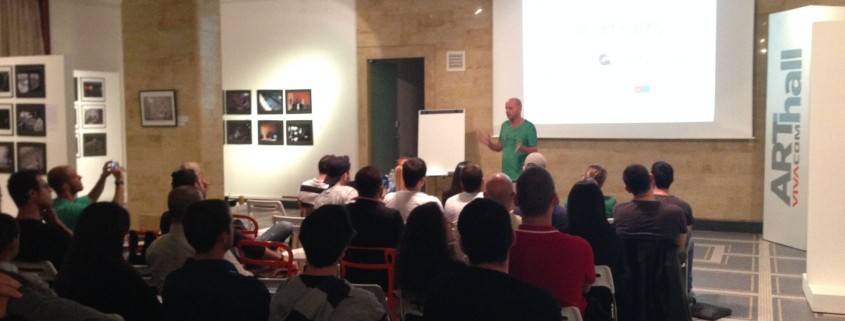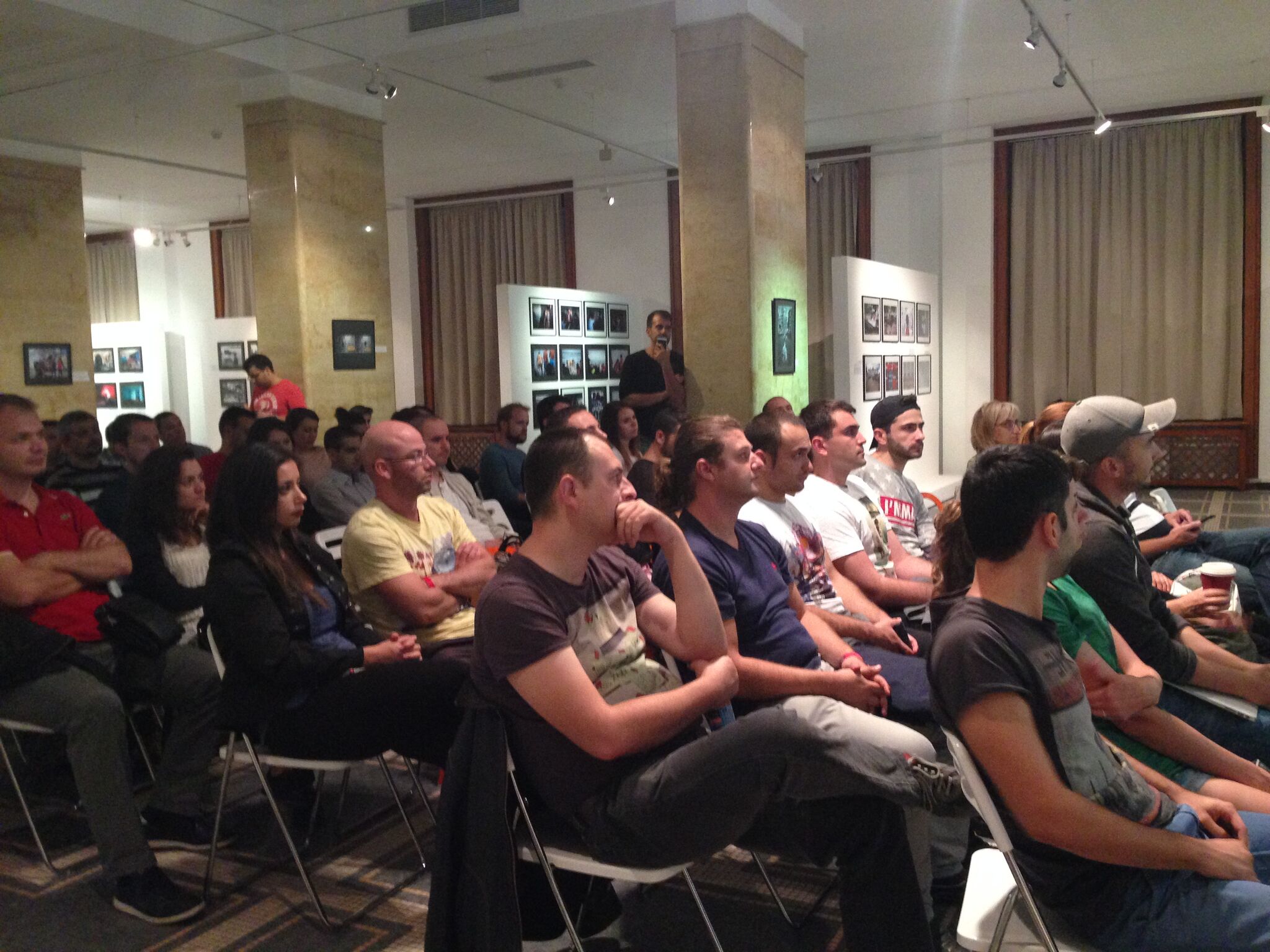StartupYard FastLanes 2 Startups in Sofia, Bulgaria
This week, StartupYard director Cedric Maloux and I spent two days in Sofia, Bulgaria. This was stop number 2 on our 6 city tour of Central Europe for StartupYard FastLane, which kicked off in Prague this month. We visited Kosovo last week, and we have now FastLaned 11 companies so far. This was my second visit to the Bulgarian capital this year, and as before, I was not disappointed by the local startup scene.
From our FastLane event at Vivacom Art Hall, an exhibition and startup space which has been built in the former headquarters of Bulgarian Telekom, the former state telecom company, we selected two teams to join the StartupYard FastLane. These teams will now skip the first 2 steps of the StartupYard selection process, and they’ll have a much better chance of being among the startups that reach the final interviews with StartupYard.
Wize hints by @cedricmaloux – if some #startup still not sure about added value of investors pic.twitter.com/olpggFNDlC
— Stephane Gantchev (@sgantchev) September 22, 2015
StartupYard has never taken a team from Bulgaria, so we were somewhat unclear on what to expect from startups in Sofia. Chris Georgiev (@chrisGeorgiev), of Imagga and StartupBG, who organized the event and helped attract the startups we chose told us that local startups were “a little spoiled,” due to fairly good access to local programs like incubators and grants for startups.
Still, we were very impressed with the startups that pitched us, and we noted how friendly and open the attitude of the crowd was. About 60 local startupers and entrepreneurs showed up to hear the pitches.
What Pitching is Really About
During this tour, and throughout the 2 cohorts we’ve done, we’ve noticed a pattern that helps us identify really interesting founders.
First of all, the idea that the founder is pitching really doesn’t matter much, when it comes to which founders stand out. Of course we want to hear pitches that are about tech products, but beyond that, there is no keyword or area that is more likely to make a startup interesting.
Sometimes you hear that a space, like security, is “hot,” and there are a lot of companies being funded, but really, it’s just that there are a lot of problems in that space to solve, and so there are a lot of pitches about products in that space. Some are good, many are not.
So if it’s not the idea that is most interesting, what is it? For us, it’s about the founder’s ability to communicate his or her solution to a real problem. If a founder can do that in a way that makes the solution seem obvious, even inevitable, then that is a very interesting founder indeed.
But we don’t expect founders to be born with those skills. We only expect them to be able to learn them, and grasp their importance.
That’s why during our tour, we are meeting with as many of the teams as possible before the pitching events, to give them individual training on pitching, and to watch how they react to our input. The founders who can implement simple feedback into their pitches, and improve dramatically over the course of a single day, are the types of founders we want to work with.
The results are pretty surprising. In Sofia, for example, one founder, the rare business oriented founder with a lot of experience in marketing and communications, at first approached the pitch training with some obvious confidence. He knew sales, so this was going to be easy. But as we worked through his position statement (the core of the pitch) it became clear that his sales skills weren’t translating to pitching as he expected.
What impressed us about that founder, and the reason we FastLaned his startup, was that he took that experience, and built on it, delivering a far better pitch than he had started with. What is often surprising is that after only a few hours of work, founders who were hopeless at explaining their ideas to others can become so much better at it. We might not end up taking that startup for any number of reasons, but the reason won’t be because we don’t understand his idea.
At every one of these events so far, people who have attended pitch training with us have told us how much it helped them to really understand how to communicate their ideas. Imagine what 3 months of acceleration can do.
After all, as founders, this would be their daily job in a successful company. It’s more than an exercise- it’s what they will have to do in order for the company to grow. Talking to investors, hiring new people, and signing new clients, is all about making them believe in what you’re doing. That’s all about pitching. So we look for founders that can embrace pitching, because it will be central to everything they do going forward.
This also confirms a suspicion we had last year, that we had rejected many applications that might have been very good startups indeed, simply because they weren’t yet able to relate the ideas in a clear and persuasive way. That shows that a tour like this one is probably more important than we even suspected.
This reaffirms how important pitching events can really be. We can’t tell, from a written application, if a founder has the ability to grow in this way. Some really don’t. Others surprise even themselves.
The most interesting founders, in my view, are the ones who can grasp the underlying importance of the exercise- which is to define, in as simple and complete a way as possible, what their company will do to benefit the world. It’s not about the ideas being presented, but the ability of the founders to communicate to people they don’t know; to bring themselves to the level of their audience, rather than to find an audience that is already at their level.
Moreover, developing a killer pitch is an exercise in self-examination. Do you really believe in this solution? Is your approach really as simple and as beneficial as you’re claiming? Or is it difficult to talk about because it’s not as easy as it should be? In the process of developing their pitch, founders have to address those questions over and over. Ultimately, if you can’t find some way of selling your ideas, maybe they aren’t good enough to sell yet.
A founder who is humble and self-aware, and also confident enough to address these problems head on, and solve them, is an ideal candidate for StartupYard. The idea can and will change, but the person doesn’t change as much. If they aren’t flexible and self-aware when they start, there isn’t much we can do to make them more flexible and self-aware at the end of the process. We can foster good habits, but it’s much harder to kill bad ones.
More than anything, I see the failures that we have had at StartupYard have been connected with this. The idea was good enough, but the founder wasn’t flexible enough to adapt it, and make it really great. On the flip side, our biggest successes in the last few years have been from founders who could accept change, and were not afraid to question themselves.
We talk about “passion,” quite a lot. Passion is essential. But passion doesn’t mean blind belief. It means commitment, and ultimately, the willingness to do what is necessary to succeed. Often, when we hear: “I will do whatever it takes,” what that really means is: “I will do whatever it takes, except changing my mind.” But that last part- the willingness to adapt, is really the only thing that accounts. It’s the only thing that separates most entrepreneurs from the great ones.
The opportunity to really see what passion means to these founders, on an individual basis, has made this tour worth our while so far.





